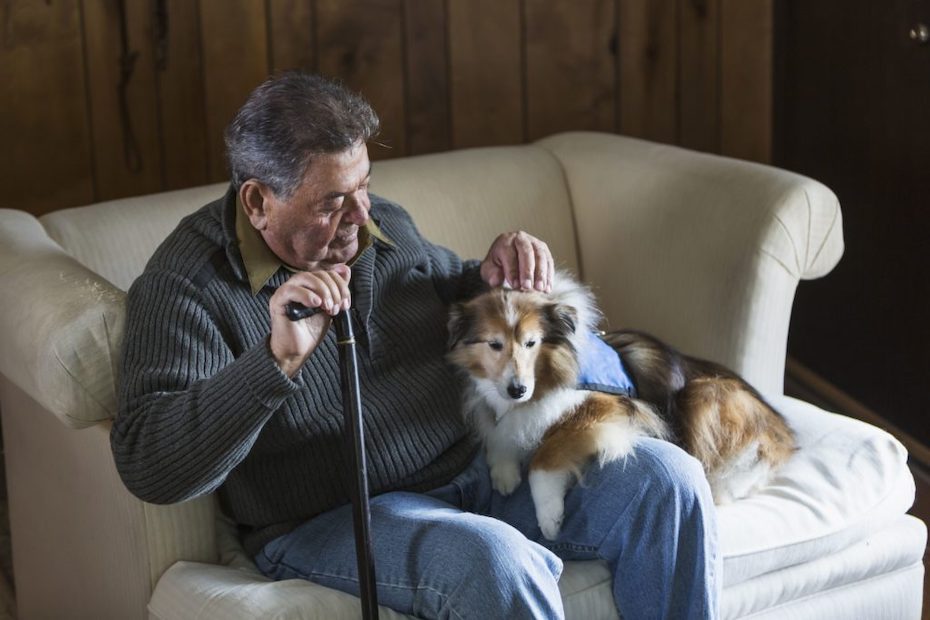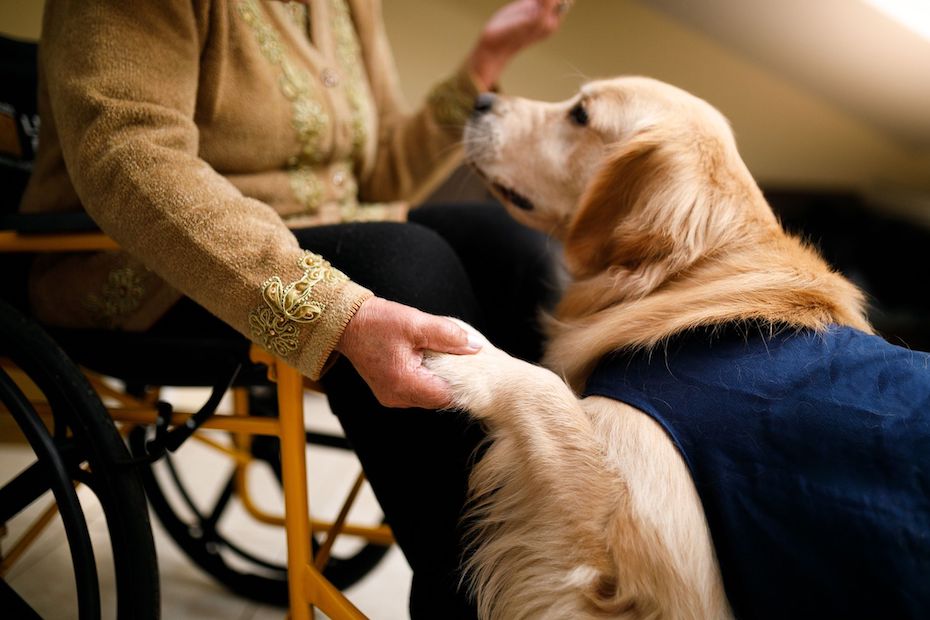Is A Guard Dog A Service Dog?
Service dogs play a vital role in the lives of people with disabilities, ranging from autism to muscular dystrophy. These loving animals help their owners perform day-to-day tasks, and some are specially trained for people with diabetes, epilepsy, or PTSD. Service dogs play an important practical part in the lives of their partners, just they also become loving friends.
In this blog, we'll define what a service dog is, review common breeds used, and examine the types of service dogs available. Nosotros'll too review the benefits of service dogs for people with disabilities.
What is a Service Domestic dog?
Co-ordinate to the Americans with Disabilities Human activity, service dogs are particularly trained to perform specific tasks for people with disabilities. These disabilities can be physical, sensory, psychiatric, intellectual, or mental.
Service dogs take full public access rights, which means they can get places where other animals aren't allowed. This includes restaurants, libraries, and public transportation. There is no universally-accepted list of types of service dogs, but we'll review some of the most common afterward in this blog.
Which Breeds Brand the Best Service Dogs?
We know that dogs have an outstanding sense of smell that far surpasses humans. In fact, their sense of odour is 10,000 – 100,000 times meliorate than that of people. But information technology takes more than than a skilful nose to be a service canis familiaris. The breeds most normally used equally service dogs share the following fundamental characteristics:
- A desire to work. Your service dog should exist happier on a walk or at the dog park than they are laying around at domicile.
- A calm demeanor. Your service canis familiaris can't cause disturbances in public or be easily startled by their environment.
- Intelligence. Your service dog has to perform complex tasks that require innate intelligence and skillful decision making.
- A friendly disposition. Your service dog must be friendly and comfortable around people and other animals.
- A loving disposition. Your service dog must be able to grade a potent bond to best serve your needs.
With that in mind, here are a few of the domestic dog breeds that make the best service dogs:
- Labradors (American and English)
- Golden Retrievers
- German Shepherds
- Poodles
- Boxers
- Great Danes
- Border Collies
- Bernese Mountain Dogs
- Pomeranians
- Portuguese Water Dogs

Types of Service Dogs
There are many types of service dogs out there, and each type offers a host of unique characteristics and benefits. Let's take a closer look at each blazon and the benefits of companion dogs for people with disabilities.
Allergy Detection Dogs
These dogs are specially trained to find and alert to the olfactory property of allergens, such as peanuts, gluten, or eggs. Nutrient allergies are on the rise, and some people go into anaphylactic daze from touching even a tiny amount of an allergen. Allergy detection dogs can pick up the aroma of a harmful allergen before their person even comes into contact with it.
Allergy detection dogs are frequently paired with children, since they're more likely to have severe allergies than adults. This provides kids with more independence and likewise gives their parents more than comfort and security.
Nearly allergy detection dogs wearable vests with pockets for medical data and medication. In many cases, the vest will have a patch directing responders to cheque their pockets in the event of an emergency.

Autism Service Dogs
Oftentimes paired with children, autism service dogs are trained to assistance people navigate social settings. Many people with autism take trouble reading social cues and forming connections with their peers. Dogs make for the perfect icebreaker and can provide a sense of predictability and condolement for people with autism.
Autism support dogs help children connect with their classmates, which can also boost their confidence. Dogs likewise provide judgement-complimentary dear and companionship, which can help people with autism improve their communication skills and keep their emotions under control.
Autism service dogs are trained to keep children with autism from running away and can also runway them if they practice run off. They tin can likewise interrupt harmful behavior or alarm the parents of a child with autism to a potentially unsafe situation. If their partner is young and/or not-verbal, autism service dogs should carry emergency protocols and contact information.
Diabetic Alarm Dogs
These service dogs are specifically trained to alert their person to potentially-deadly blood carbohydrate highs (hyperglycemia) and lows (hypoglycemia). When the dog alerts, the partner knows to test their claret and then inject insulin or ingest glucose to conform their levels. Similar other service dogs, diabetic alert dogs provide their owners with a heightened sense of independence and security.
Diabetic alarm dogs are typically too trained to alert other people in the household or gear up off an alarm if their person needs medical help. Some dogs are fifty-fifty trained to call 911 on a special G-9 alert telephone if they're home alone. These dogs should also carry emergency protocols in their vests and then first responders know how to go on.
Guide Dogs
Mayhap the well-nigh commonly-known type of service dogs, guide dogs help bullheaded and depression-vision individuals navigate the world. These dogs typically wear a special harness with a handle for their owner to grasp, rather than a belong.
Different other service dogs, guide dogs practice what'due south chosen selective disobedience. This means they obey commands, simply still make choices based on their own cess of a situation. For case, their partner may command them to cross the street, but the dog will disobey if there are cars coming.
Labradors, golden retrievers, and German language shepherds are usually trained as guide dogs. If partners have an allergy, they might opt for a labradoodle or a poodle, both of which are hypoallergenic.
Hearing Dogs
Similar their name suggests, hearing dogs are trained to help their deaf and hard-of-hearing partners. When the dog hears a item cue, they alert their owner and lead them towards the noise. These cues include fume or fire alarms, doorbells, door knocking, phones, alarm clocks, and even the person's name.
Similar other support dogs, hearing dogs increase their partners' independence and awareness, both in and out of the home. Common breeds used include labradors, golden retrievers, cocker spaniels, and poodles (miniature or standard). While they aren't required to wear special gear, some owners outfit their hearing dogs in brilliant orange.

Mobility Assist Dogs
Many people with disabilities rely on mobility assistance dogs to assist them perform everyday tasks. This includes retrieving objects, opening doors, pressing automatic door buttons, and turning on lights. Mobility support dogs are typically partnered with people who have things like:
- Spinal cord injuries
- Encephalon injuries
- Muscular dystrophy
- Arthritis
- Cognitive palsy
Some mobility help dogs are specifically trained to caryatid partners with residuum issues. Bracing dogs must exist big enough to support their person and are typically 55-plus pounds. They ofttimes wear specially-fitted harnesses that help them assist their owner.
Additionally, some mobility aid dogs specialize in helping owners in wheelchairs. They can remember objects, open doors, and assist with transfers to chairs, beds, or bathtubs. They may wear a special harness that allows them to assist pull their possessor's wheelchair.
Psychiatric Service Dogs
These companion dogs are specifically trained to aid individuals who suffer from things like depression, anxiety, and post-traumatic stress disorder (PTSD). They're able to sense a change in their owner when they're nearly to experience negative symptoms, such as an anxiety attack or a flashback.
There are many benefits of service dogs for anxiety, depression, and PTSD. Owning a service dog can force people with depression and/or feet to accept care of themselves and go out into the world.
There are also benefits of service dogs for veterans, who frequently suffer from PTSD. Psychiatric service dogs can serve as a physical barrier betwixt their owner and other people, helping to preserve their personal space. Support dogs can also assist their partners feel more conviction when entering their home. Psychiatric service dogs are the main type of service dog for PTSD.
Information technology's of import to remember that psychiatric service dogs are unlike than emotional back up dogs or therapy dogs. Like other service dogs, they become through all-encompassing training and aren't considered pets under the legal definition.
Seizure Warning Dogs
These service dogs assist individuals before, during, and after a seizure. This includes:
- Finding help for their person or calling 911 with a K-ix alert phone.
- Helping their partner regain consciousness after a seizure.
- Physically moving their person if they have a seizure in an unsafe place.
- Using deep pressure stimulation to end their partner's seizure early.
- Bringing medicine to their person as they come out of a seizure.
Scientists and medical professionals are divided over whether seizure alarm dogs can be trained. Some people believe dogs can exist trained to warning for seizures. Nevertheless, others believe it'south something a dog does naturally based on intuition and the bond with its human partner.
Source: https://udservices.org/blog/types-of-service-dogs/
Posted by: porterfladdre1945.blogspot.com


0 Response to "Is A Guard Dog A Service Dog?"
Post a Comment